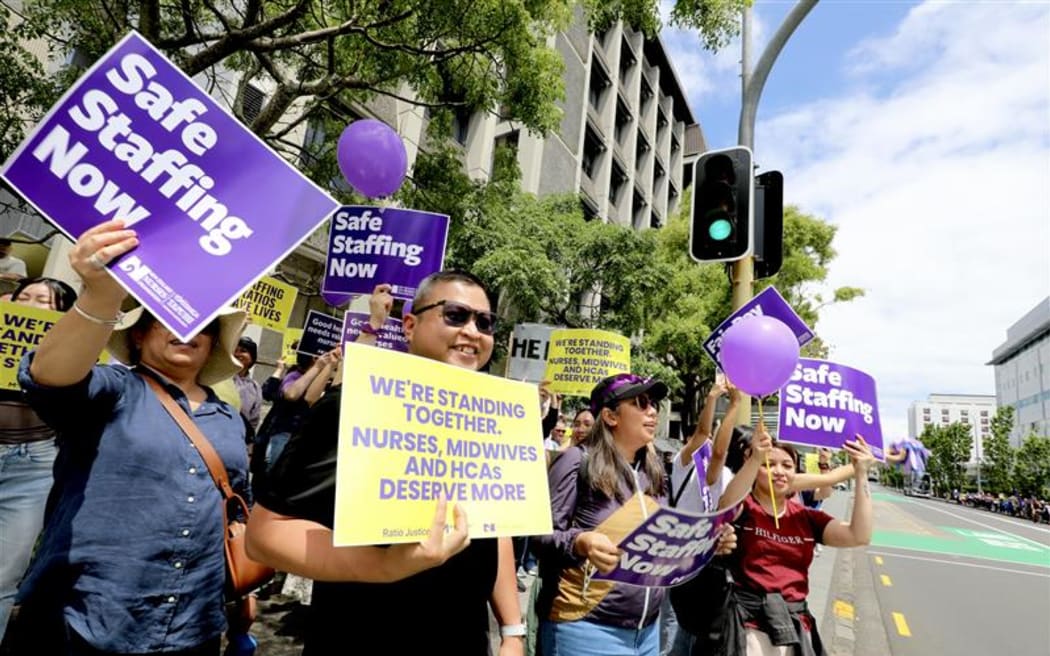
The New Zealand Nurses Organisation requested information about staffing shortages. Photo: RNZ / Marika Khabazi
Health NZ has apologised to the nurse's union, after the Ombudsman found its refusal to release information about staffing shortages was unreasonable.
The data - which Health NZ finally released a year after it was requested under the Official Information Act - revealed more than half of all day shifts and more than a third of evening shifts between January and November last year were understaffed.
Chief Ombudsman John Allen found both delaying and later refusing to supply the data was unreasonable, as were the reasons Health NZ gave for doing so.
In a letter to New Zealand Nurses Organisation strategic researcher Nathalie Jaques, Health NZ's manager government services Danielle Coe apologised for "any frustration" the delay and refusal may have caused.
"We acknowledge that refusing this request was not appropriate and may have contributed to delays in the important work you are undertaking on behalf of our kaimahi."
Coe confirmed Health NZ was "pro-actively strengthening its processes" to ensure it met obligations under the Official Information Act.
The Ombudsman's findings related to Jaques' requests in April 2024 for data from Health NZ's Care Capacity Demand Management System on how many shifts were understaffed, broken down by district.
The OIA requires agencies make and communicate decisions on requests "as soon as reasonably practicable", and no later than 20 working days after the request is received.
Health NZ initially extended the time it needed to respond to the request, before telling Jaques on 26 June 2024 it had made a decision and collated most of the information, but was still finalising the remainder, which it would provide by 12 July 2024.
Repeated follow-ups by Jaques went unanswered, until Health NZ wrote on 5 August 2024, saying it was still waiting for information.
A week later, Health NZ wrote again to Jaques, this time refusing her request under section 9(2)(j) of the Official Information Act, which allowed the withholding of information that could prejudice or disadvantage negotiations.
While Health NZ later provided the information under the Employment Relations Act, information released under the ERA has limitations on its use, including that it remained confidential, which meant the NZNO could not release the information to members or the media.
The ombudsman concluded Health NZ's decision to extend the timeframe and communicate its decision on the release was unreasonable, as were its actions in telling Jaques it had made a decision on 26 June.
The Ombudsman said he had not been given any detailed explanation of Health NZ's decision-making, but in the absence of evidence to the contrary, could "only assume Health New Zealand had not actually made a proper decision on the request on 26 June" and its response "was merely an attempt to gain further time to consider the request".
Nor did Health NZ provide any explanation or rationale for why it decided to withhold the information under the section of the OIA relating to negotiations, and the Ombudsman said he could not see how the release of this information would have prejudiced or disadvantaged Health NZ in its negotiations, leading him to conclude the decision was also unreasonable.
NZNO chief executive Paul Goulter welcomed the apology.
The Ombudsman has previously chastised Health NZ for its handling of official information act requests.
In March, outgoing Ombudsman Peter Boshier said Health New Zealand had "created a process for itself that was inherently contrary to law" following his investigation into why RNZ was blocked for months from getting information about Dunedin Hospital.
Boshier also highlighted his concerns about Health NZ in comments he made before leaving the role, singling the agency out "because they are the naughty child".
"Health New Zealand is of particular concern," he said. "I regret to say that I have found, on a number of occasions, that it is not always following the letter and spirit of the law.
"For a relatively new agency, Health NZ is generating an increasing number of complaints, mostly about the time it takes to make a decision, or its refusal to release parts or all of the requested information."
The apology comes on the eve of the second nationwide nurses strike this week, which will see more than 36,000 NZNO nurses, midwives, health care assistants and kaimahi hauora walk off the job.
Sign up for Ngā Pitopito Kōrero, a daily newsletter curated by our editors and delivered straight to your inbox every weekday.






